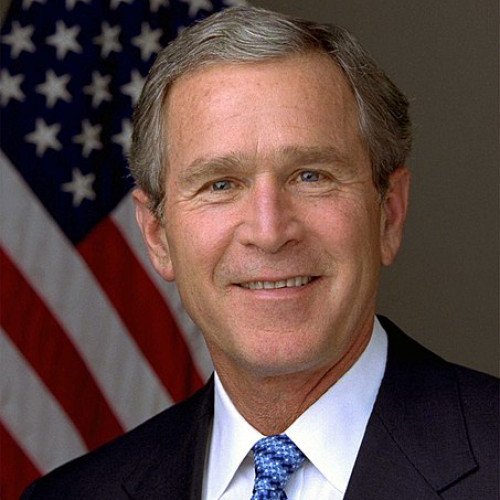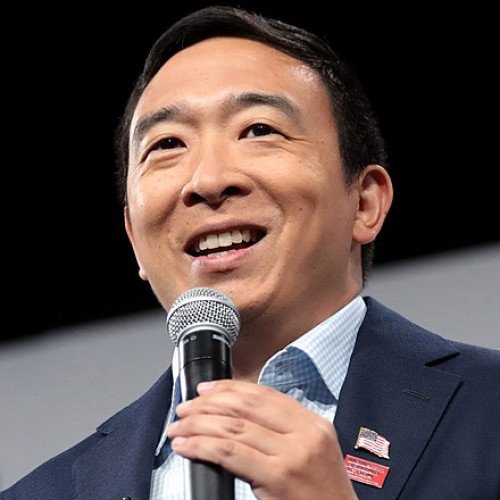George W. Bush VS Andrew Yang

George W. Bush
George Walker Bush (born July 6, 1946) is an American politician and businessman who served as the 43rd president of the United States from 2001 to 2009. A member of the Republican Party, he had previously served as the 46th governor of Texas from 1995 to 2000. Born into the Bush family, his father, George H. W. Bush, served as the 41st president of the United States from 1989 to 1993. Bush is the eldest son of Barbara and George H. W. Bush. As such he is the second son of a former United States president to himself become the American president, with the first being John Quincy Adams, the son of John Adams. He flew warplanes in the Texas and Alabama Air National Guard. After graduating from Yale College in 1968 and Harvard Business School in 1975, he worked in the oil industry. Bush married Laura Welch in 1977 and unsuccessfully ran for the U.S. House of Representatives shortly thereafter. He later co-owned the Texas Rangers baseball team before defeating incumbent Ann Richards in the 1994 Texas gubernatorial election. As governor, Bush successfully sponsored legislation for tort reform, increased education funding, set higher standards for schools, and reformed the criminal justice system. Bush also helped make Texas the leading producer of wind powered electricity in the U.S. Bush was elected president in 2000 when he defeated Democratic incumbent Vice President Al Gore after a narrow and contested win that involved a Supreme Court decision to stop a recount in Florida. He became the fourth person to be elected president without a popular vote victory. Upon taking office, Bush pushed through a $1.3 trillion tax cut program and the No Child Left Behind Act, a major education reform bill. He also pushed for socially conservative efforts, such as the Partial-Birth Abortion Ban Act and faith-based welfare initiatives. In response to the September 11 terrorist attacks, Bush created the Department of Homeland Security and launched a "War on Terror" that began with the war in Afghanistan in 2001. He also signed into law the controversial Patriot Act in order to authorize surveillance of suspected terrorists. In 2003, Bush ordered an invasion of Iraq, beginning the Iraq War, with the administration arguing that the Saddam Hussein regime possessed an active weapons of mass destruction (WMD) program, and that the Iraqi government posed a threat to the U.S. Some administration officials falsely claimed that Hussein had an operational relationship with Al-Qaeda, the perpetrators of the 9/11 attack. No stockpiles of WMDs or an active WMD program were ever found in Iraq. Bush also signed into law the Medicare Modernization Act, which created Medicare Part D, and funding for the AIDS relief program known as PEPFAR. Bush was re-elected to a second term in the 2004 presidential election, defeating Democratic Senator John Kerry in a close race. During his second term, Bush reached multiple free trade agreements and successfully nominated John Roberts and Samuel Alito to the Supreme Court. He sought major changes to Social Security and immigration laws, but both efforts failed. The wars in Afghanistan and Iraq continued, and in 2007 he launched a surge of troops in Iraq. Bush received criticism from across the political spectrum for his handling of Hurricane Katrina, and the midterm dismissal of U.S. attorneys. Amid this criticism, the Democratic Party regained control of Congress in the 2006 elections. In December 2007, the U.S. entered the Great Recession, prompting the Bush administration to obtain congressional approval for multiple economic programs intended to preserve the country's financial system, including the Troubled Asset Relief Program (TARP) to buy toxic assets from financial institutions. Bush was among the most popular, as well as unpopular, U.S. presidents in history; he received the highest recorded approval ratings in the wake of the 9/11 attacks, but one of the lowest such ratings during the 2008 financial crisis. Bush finished his second term in office in 2009 and returned to Texas. In 2010, he published his memoir, Decision Points. His presidential library opened in 2013. His presidency has been rated as below-average in historical rankings of U.S. presidents, although his public favorability ratings have improved since leaving office.
Statistics for this Xoptio

Andrew Yang
Andrew M. Yang (born January 13, 1975) is an American entrepreneur, politician, philanthropist and Democratic candidate for New York City mayor. Originally a lawyer, Yang began working in startups and early stage growth companies as a founder or executive from 2000 to 2009. In 2011, he founded Venture for America (VFA), a nonprofit organization focused on creating jobs in cities struggling to recover from the Great Recession. He ran in the 2020 Democratic presidential primaries, and is running in the 2021 New York City mayoral election. The son of immigrants from Taiwan, Yang was born and raised in New York. He attended Brown University and then Columbia Law School. Dissatisfied with his work as an attorney, Yang began working for startups during the dot-com bubble before spending a decade as an executive at test preparation company Manhattan Prep. In 2011, Yang founded VFA, which recruits top college graduates into a two-year fellowship program at startups in developing cities across the United States. The Obama administration selected him in 2011 as a "Champion of Change" and in 2015 as a "Presidential Ambassador for Global Entrepreneurship." Yang left VFA in 2017 to focus on his presidential campaign. In 2018, he authored The War on Normal People, which outlines several of his campaign's central ideas. On November 6, 2017, Yang filed with the Federal Election Commission (FEC) to run for President of the United States in the 2020 election. Yang's campaign largely focused on responding to the rapid development of automation, which is increasingly leading to workforce challenges and economic instability in the United States. His signature policy was the "Freedom Dividend," a universal basic income (UBI) of $1,000 a month to every American adult as a response to job displacement by automation, one of the primary factors that he claims led to Donald Trump's election in 2016. Considered a dark horse candidate throughout much of the primary, Yang received significant popularity online, with The New York Times calling him "The Internet's Favorite Candidate". News outlets described Yang as the most surprising candidate of the 2020 election cycle, going from a relative unknown to a major competitor in the race. Yang qualified for and participated in seven of the first eight Democratic debates, and has been credited with elevating discussions on UBI, automation, and autism to the national level, as well as for engaging Asian Americans in presidential politics.Yang's campaign was noted for its happy-go-lucky and "tech-friendly" nature. His supporters, informally known as the "Yang Gang", included several high-profile celebrity endorsements and were noted for their ideological and political diversity. Yang suspended his campaign on February 11, 2020, shortly after the New Hampshire primary, pledging that he and his movement are "just getting started." Following his campaign's end, Yang joined CNN as a political commentator, announced the creation of the political nonprofit organization Humanity Forward, and is running for the Democratic nomination in the 2021 New York City mayoral election.